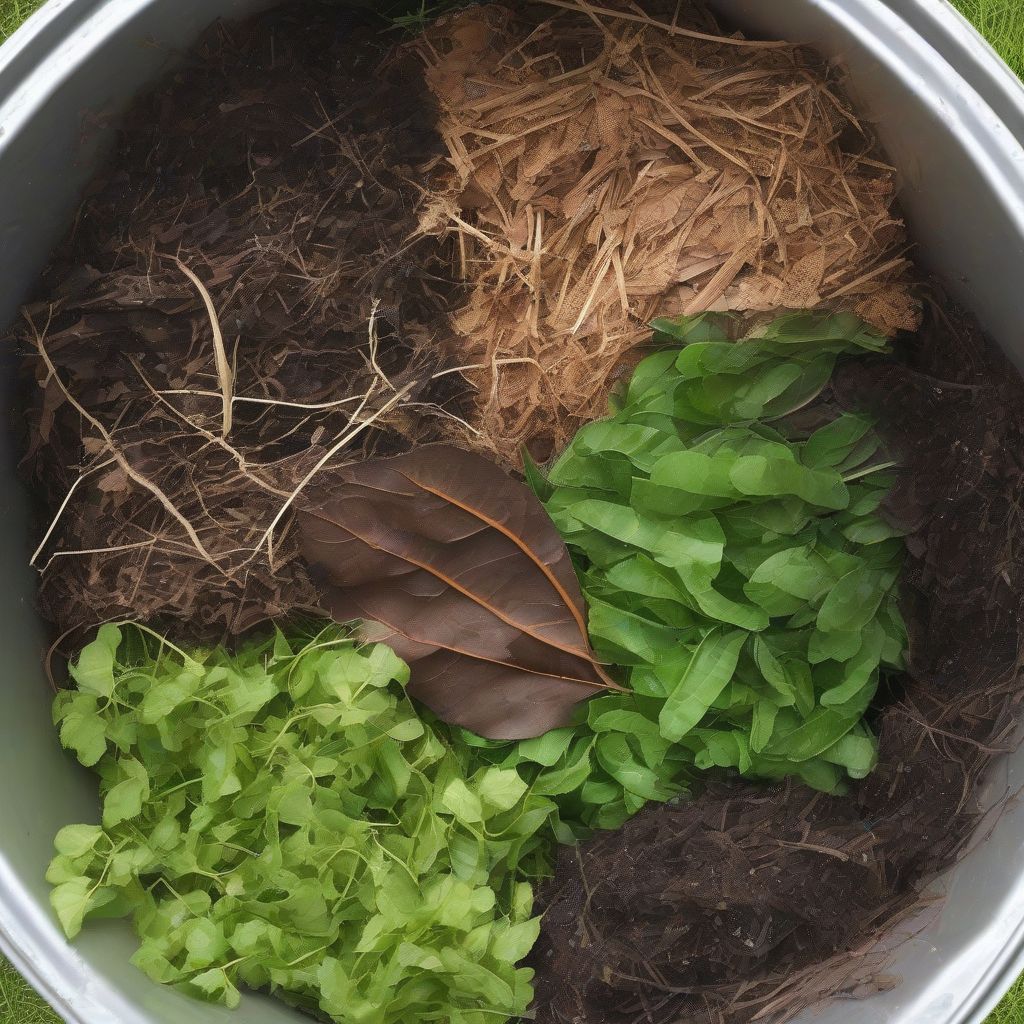“The best fertilizer is the gardener’s shadow,” goes an old gardening proverb. And while tending to your plants with care is crucial, nothing nourishes them quite like nutrient-rich compost. It’s like black gold for your garden, breathing life into the soil and fueling abundant, healthy growth.
As a nutritionist and meal-prep coach, I know the power of using wholesome, natural ingredients. The same principle applies to gardening! Composting allows you to transform kitchen scraps and yard waste into a potent, organic fertilizer, reducing waste and enriching your garden.
Understanding the Magic of Compost
Composting is nature’s recycling system. It’s the process of breaking down organic matter, like leaves, vegetable peels, and grass clippings, into a dark, crumbly substance called compost. This “black gold” is teeming with beneficial microorganisms that improve soil structure, boost nutrient content, and enhance overall plant health.
Building Your Compost Pile: A Step-by-Step Guide
Creating a thriving compost pile might seem daunting, but it’s remarkably straightforward. Here’s a simple breakdown:
1. Choose Your Compost Bin
Select a location with good drainage and some shade. You can choose from various compost bins, from DIY structures to ready-made tumblers.
2. Layer Your Ingredients
Think of your compost pile as a layer cake, alternating between “brown” and “green” materials.
- Browns: Carbon-rich materials like dried leaves, twigs, shredded paper, and cardboard.
- Greens: Nitrogen-rich materials such as fruit and vegetable scraps, grass clippings, coffee grounds, and eggshells.
 Composting Layers
Composting Layers
3. Maintain the Right Balance
Aim for a ratio of about 2:1 or 3:1 for browns to greens. This balance ensures optimal decomposition.
4. Provide Air and Moisture
Turn the pile regularly with a garden fork or aerator to provide oxygen for the microorganisms breaking down the materials. Keep the pile moist, like a wrung-out sponge.
5. Be Patient
Composting takes time. Depending on the materials and conditions, it can take anywhere from a few months to a year for your compost to mature.
Troubleshooting Common Composting Challenges
Even seasoned gardeners encounter composting hiccups. Here’s how to address common issues:
-
Foul odors: Your compost pile shouldn’t smell repulsive. If it does, it’s likely too wet or lacks sufficient “brown” materials. Turn the pile and add more dry, carbon-rich ingredients.
-
Slow decomposition: A sluggish compost pile might be too dry or lacking nitrogen. Turn the pile and add water or “green” materials as needed.
-
Pests: Properly maintained compost piles rarely attract pests. If you encounter unwanted visitors, ensure your bin is properly sealed and avoid composting oily foods or meat scraps.
Reaping the Rewards: Using Compost in Your Garden
Once your compost has matured into a dark, crumbly, earthy-smelling substance, it’s ready to nourish your garden.
-
Topdressing: Spread a layer of compost around the base of your plants, acting as a natural mulch that retains moisture and suppresses weeds.
-
Soil amendment: Mix compost into your garden beds before planting to improve soil structure, drainage, and nutrient content.
-
Potting mix: Combine compost with other ingredients like peat moss and perlite to create a nutrient-rich potting mix for your container plants.
Composting for Organic Gardening Success: A Natural Partnership
Composting isn’t just about reducing waste; it’s about creating a closed-loop system in your garden, mimicking nature’s cycles. By transforming kitchen scraps and yard waste into valuable compost, you’re returning nutrients to the soil, feeding your plants, and promoting a thriving ecosystem.
Remember, every leaf, every vegetable peel, every eggshell is an opportunity to create “black gold” for your garden.
So, roll up your sleeves, start composting, and watch your organic garden flourish! What are your favorite composting tips or questions about getting started? Share your thoughts in the comments below!
For more gardening tips, check out our articles on The Role of Organic Fertilizers in Garden Health, How to Fertilize Plants in Containers for Best Results, and Essential Garden Maintenance Tasks for Every Season. Happy gardening!
[amazon bestseller=”compost bin”]
